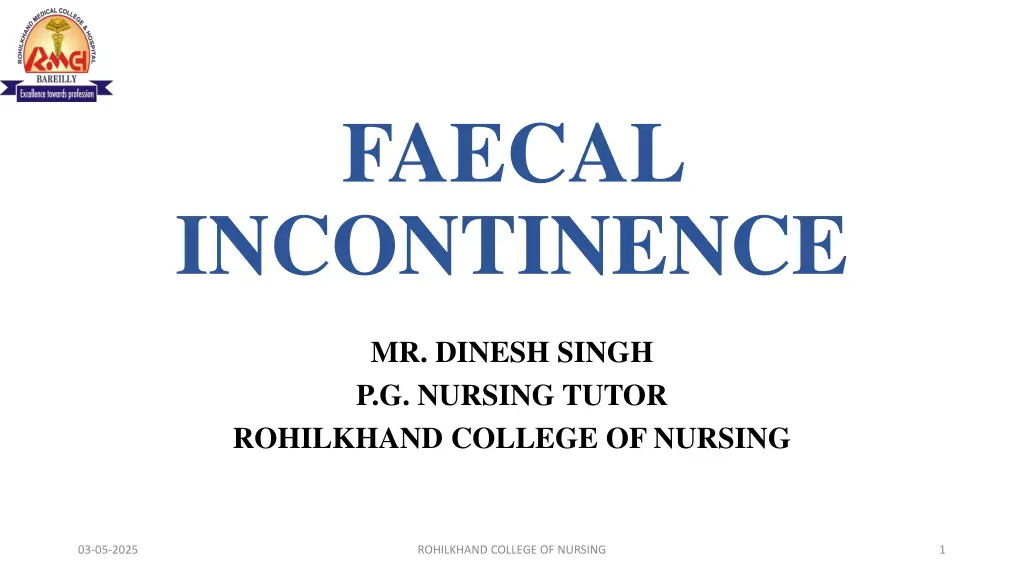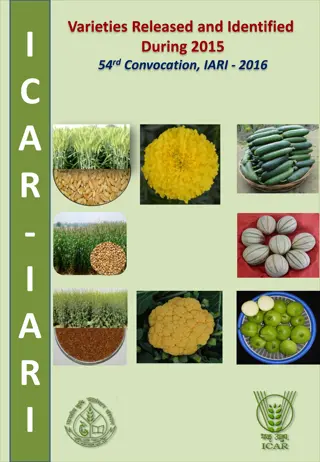
Understanding Faecal Incontinence: Causes, Manifestations & Management
Explore faecal incontinence, from causes like muscle damage to clinical signs such as urgency and constipation. Learn about prevention and management strategies.
Download Presentation

Please find below an Image/Link to download the presentation.
The content on the website is provided AS IS for your information and personal use only. It may not be sold, licensed, or shared on other websites without obtaining consent from the author. If you encounter any issues during the download, it is possible that the publisher has removed the file from their server.
You are allowed to download the files provided on this website for personal or commercial use, subject to the condition that they are used lawfully. All files are the property of their respective owners.
The content on the website is provided AS IS for your information and personal use only. It may not be sold, licensed, or shared on other websites without obtaining consent from the author.
E N D
Presentation Transcript
FAECAL INCONTINENCE MR. DINESH SINGH P.G. NURSING TUTOR ROHILKHAND COLLEGE OF NURSING 03-05-2025 ROHILKHAND COLLEGE OF NURSING 1
OBJECTIVES Introduction of the Peritonitis. Define the Peritonitis. Explain the causes of Peritonitis. State the clinical manifestations of Peritonitis. Elaborate the diagnostic evaluation of Peritonitis. Discuss the management of Peritonitis. Describe the prevention of Peritonitis. 03-05-2025 ROHILKHAND COLLEGE OF NURSING 2
INTRODUCTION Fecal incontinence is not being able to control bowel movements. Stool leaks from the rectum without warning. Fecal incontinence ranges from an occasional leakage of stool while passing gas to a complete loss of bowel control. Fecal incontinence is sometimes called bowel incontinence. 03-05-2025 ROHILKHAND COLLEGE OF NURSING 3
DEFINITION Involuntary or the uncontrolled passage of stool may be due to multiple causes. Also called bowel incontinence, fecal incontinence ranges from an occasional leakage of stool while passing gas to a complete loss of bowel control. 03-05-2025 ROHILKHAND COLLEGE OF NURSING 4
CAUSES 1. The most common cause of bowel incontinence is damage to the muscles around the anus (anal sphincters) 2. Vaginal childbirth can damage the anal sphincters or their nerves. 3. Anal surgery can also damage the anal sphincters or nerves. 03-05-2025 ROHILKHAND COLLEGE OF NURSING
Other causes Diarrhea (often due to an infection or irritable bowel syndrome) Impacted stool (due to severe constipation, often in older adults) Inflammatory bowel disease (Crohn s disease or ulcerative colitis) Nerve damage (due to diabetes, spinal cord injury, multiple sclerosis, or other conditions) Radiation damage to the rectum (such as after treatment for prostate cancer) Cognitive (thinking) impairment (such as after a stroke or advanced Alzheimer s disease) 03-05-2025 ROHILKHAND COLLEGE OF NURSING 6
CLINICAL MANIFESTATION Urgency and loss of control Poor control of fetus Diarrhea Gas and bloating Constipation 03-05-2025 ROHILKHAND COLLEGE OF NURSING 7
DIAGNOSTIC EVALUATION Rectal examination Endoscopic examination Sigmoidoscopy Barium enema X-rays Anorectal manometry 03-05-2025 ROHILKHAND COLLEGE OF NURSING 8
MANAGEMENT Anti-diarrheal drugs such as loperamide (Imodium A-D) and those containing diphenoxylate and atropine (Lomotil). Bulk laxatives such as methylcellulose (Citrucel) and psyllium (Metamucil), if chronic constipation is causing your incontinence. 03-05-2025 ROHILKHAND COLLEGE OF NURSING 9
SURGICAL MANAGEMENT Sphincteroplasty. This procedure repairs a damaged or weakened anal sphincter that occurred during childbirth. Treating rectal prolapse, a rectocele or hemorrhoids: Surgical correction of these problems will likely reduce or eliminate fecal incontinence. Colostomy, also called bowel diversion: This surgery diverts stool through an opening in the abdomen. Doctors attach a special bag to this opening to collect the stool. Colostomy is generally considered only after other treatments haven't been successful. 03-05-2025 ROHILKHAND COLLEGE OF NURSING 10
NURSING MANAGEMENT 1. Minimize the soft drinks, beverages such as coffee, tea, alcohol, fried foods, meat etc. 2. Recommend for low fat, high protein diet, fibrous foods and green leafy vegetables etc. 3. Encourage to take balance diet to fulfill nutritional requirements. 4. Encourage for lifestyle medication, e.g. cessation of smoking and tobacco, weight loss, red meat, smoked fish, pickle, highly condimental foods. 5. Advise to take small, frequent meals to relieve abdominal discomfort. 03-05-2025 ROHILKHAND COLLEGE OF NURSING 11
Conti 6. Encourage to take high intake of fluids at least 2 liters per day. 7. Assess the color of steatorrhea, episodes of vomiting and diarrhea. 8. Take proper rest and sleep to relieve the abdominal pain. 9. Avoid such activities which increase intra- abdominal activity. 10. Monitor vital signs to prevent from shock, assess characteristics of the pain. 11. Replacement of parenteral nutrition, IV fluids to maintain fluid volume. 12. Assess the skin color, skin turgor, to identify anemia and other complications. 03-05-2025 ROHILKHAND COLLEGE OF NURSING 12
SUMMARY 03-05-2025 ROHILKHAND COLLEGE OF NURSING 13
REFERENCES 03-05-2025 ROHILKHAND COLLEGE OF NURSING 14
03-05-2025 ROHILKHAND COLLEGE OF NURSING 15


